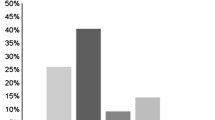Abstract
A limited amount of research indicates patient requests play a major role in genetic counselors’ self-disclosure decisions and that disclosure and non-disclosure responses to patient requests may differentially affect genetic counseling processes. Studies further suggest patient requests may be more common in prenatal settings, particularly when counselors are pregnant. Empirical evidence is limited however, concerning the nature of patient requests. This study explored genetic counselors’ experiences of prenatal patients’ requests for self-disclosure. Four major research questions were: (1) What types of questions do prenatal patients ask that invite self-disclosure?; (2) Do pregnant genetic counselors have unique experiences with prenatal patient disclosure requests?; (3) How do genetic counselors typically respond to disclosure requests?; and (4) What strategies are effective and ineffective in responding to disclosure requests? One hundred seventy-six genetic counselors completed an online survey and 40 also participated in telephone interviews. Inductive analysis of 21 interviews revealed patient questions vary, although questions about counselor demographics are most common, and patients are more likely to ask pregnant counselors questions about their personal pregnancy decisions. Participants reported greater discomfort with self-disclosure requests during pregnancy, yet also disclosing more frequently during pregnancy. Counselor responses included personal self-disclosure, professional self-disclosure, redirection, and declining to disclose. Factors perceived as influencing disclosure included: topic, patient motivations, timing of request, quality of counseling relationship, patient characteristics, and ethical/legal responsibilities. Disclosure practices changed over time for most counselors. Additional findings, practice implications, and research recommendations are discussed.

Similar content being viewed by others
References
Clark, K. (2010). Life as a pregnant genetic counselor. Journal of Genetic Counseling, 19(3), 235–237.
Fenster, S., Phillips, S., & Rapoport, E. (1986). The pregnant therapist: intrusion in the analytic space. Hillsdale: The Analytic Press.
Hanson, J. (2005). Should your lips be zipped? How therapist self-disclosure and non-disclosure affects clients. Counseling and Psychotherapy Research, 5(2), 96–104.
Hill, C. E., Thompson, B. J., & Williams, E. N. (1997). A guide to conducting consensual qualitative research. The Counseling Psychologist, 25, 517–572.
Hjalmarsson, H. (2005). Transference opportunities during the therapist’s pregnancy: three case vignettes. Psychoanalytic Social Work, 12(1), 1–11.
Kessler, S. (1992). Psychological aspects of genetic counseling. VIII. Suffering and countertransference. Journal of Genetic Counseling, 1(4), 303–308.
McCarthy Veach, P. (2011). Clinician use of self-reference: are we speaking the same language? Psychotherapy, 48, 349–358.
McCarthy Veach, P., Bartels, D. M., & LeRoy, B. S. (2007). Coming full circle: a reciprocal-engagement model of genetic counseling practice. Journal of Genetic Counseling, 16, 713–728.
McCarthy Veach, P., LeRoy, B., & Bartels, D. (2003). Facilitating the genetic counseling process: a practice manual. New York: Springer.
National Society of Genetic Counselors, Professional Status Committee Subcommittee. (2012). Professional Status Survey. Retrieved from http://www.nsgc.org/MemberCenter/LeadershipCenter/tabid/190/Default.aspx?EntryId=4245.
Paine, A., McCarthy Veach, P., MacFarlane, I. M., & LeRoy, B. S. (2010). “What would you do if you were me?” Effects of counselor self-disclosure versus non-disclosure in a hypothetical genetic counseling session. Journal of Genetic Counseling, 19(6), 570–584.
Peters, E., McCarthy Veach, P., Ward, E. E., & LeRoy, B. S. (2004). Does receiving genetic counseling impact genetic counselor practice? Journal of Genetic Counseling, 13, 387–402.
Rosenthal, E. S. (1990). The therapist’s pregnancy: impact on the treatment process. Clinical Social Work Journal, 18, 213–236.
Silverman, S. (2001). Inevitable disclosure: countertransference dilemmas and the pregnant lesbian therapist. Journal of Gay & Lesbian Psychotherapy, 4(3), 45–61.
Thomas, B. C., McCarthy Veach, P., & LeRoy, B. S. (2006). Is self-disclosure part of the genetic counselor’s clinical role? Journal of Genetic Counseling, 15, 163–177.
Udipi, S., McCarthy Veach, P., Kao, J., & LeRoy, B. S. (2008). The psychic costs of empathic engagement: personal and demographic predictor of genetic counselor compassion fatigue. Journal of Genetic Counseling, 17, 459–471.
Acknowledgments
This study was completed in partial fulfillment of the requirements for the first author’s Master of Science degree from the University of Minnesota. The authors would like to thank the genetic counselors who participated in this study. We thank Dr. Christina Palmer for serving as Action Editor on our manuscript, review process, and publication decision.
Author information
Authors and Affiliations
Corresponding author
Rights and permissions
About this article
Cite this article
Balcom, J.R., Veach, P.M., Bemmels, H. et al. When the Topic is You: Genetic Counselor Responses to Prenatal Patients’ Requests for Self-Disclosure. J Genet Counsel 22, 358–373 (2013). https://doi.org/10.1007/s10897-012-9554-2
Received:
Accepted:
Published:
Issue Date:
DOI: https://doi.org/10.1007/s10897-012-9554-2




